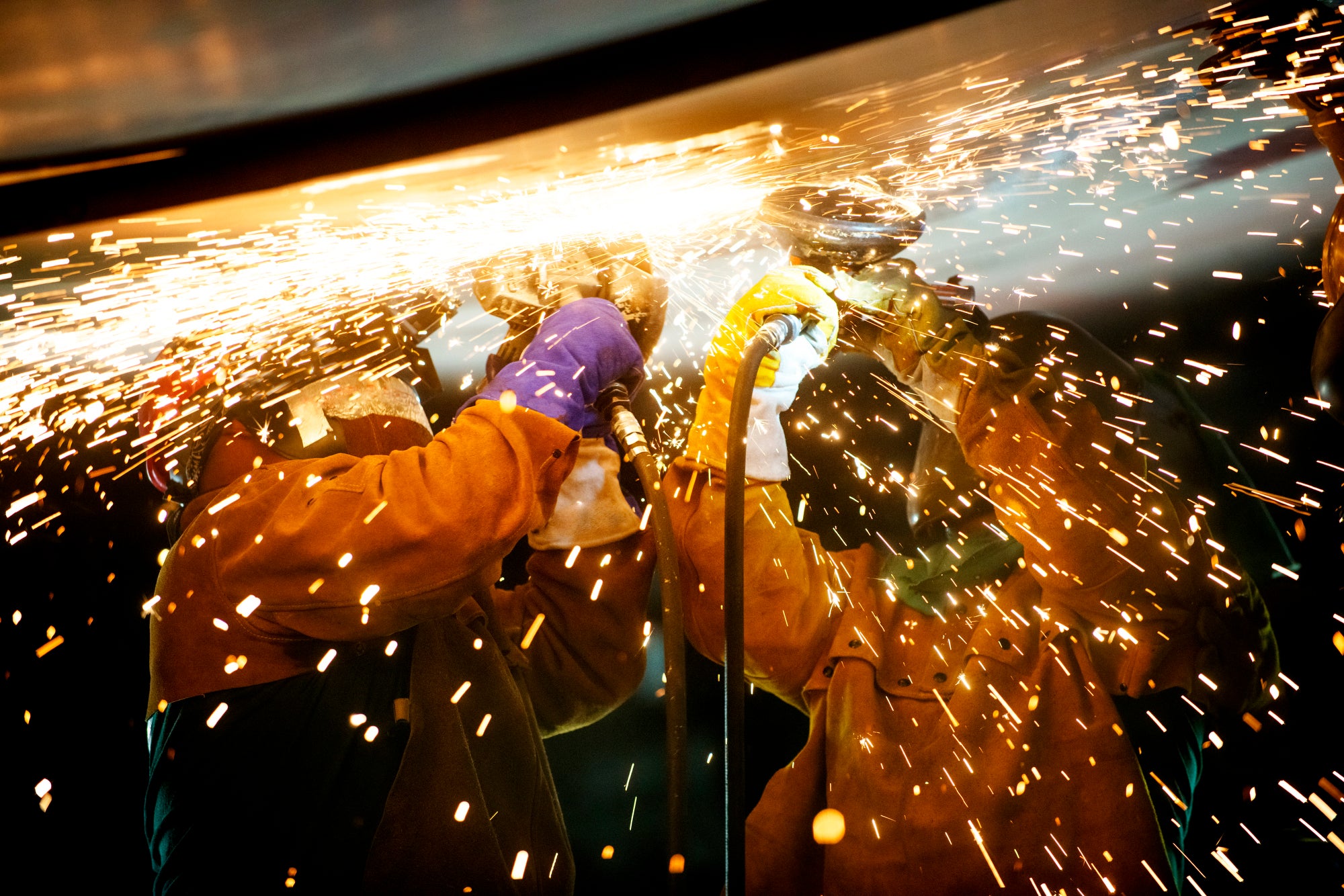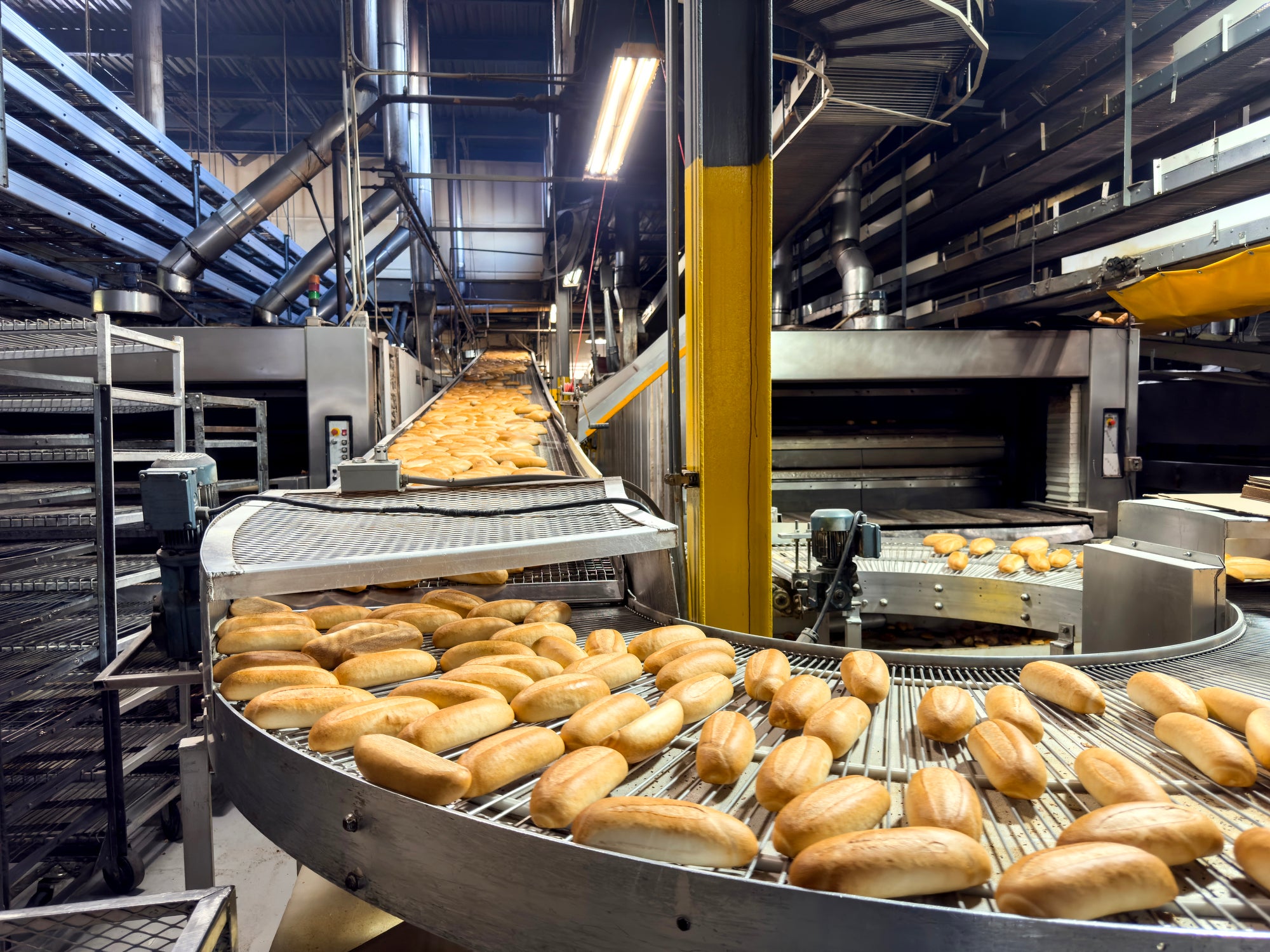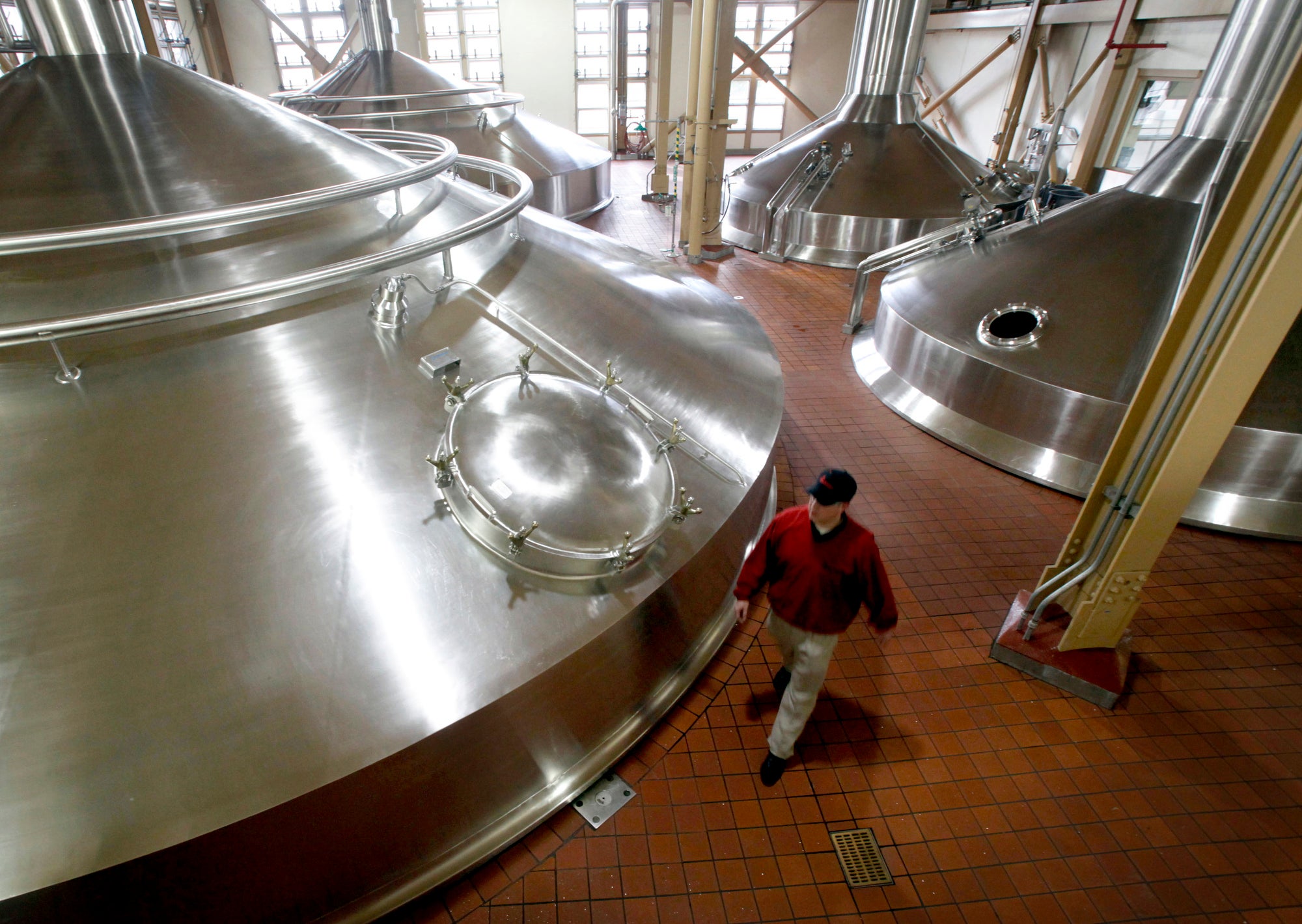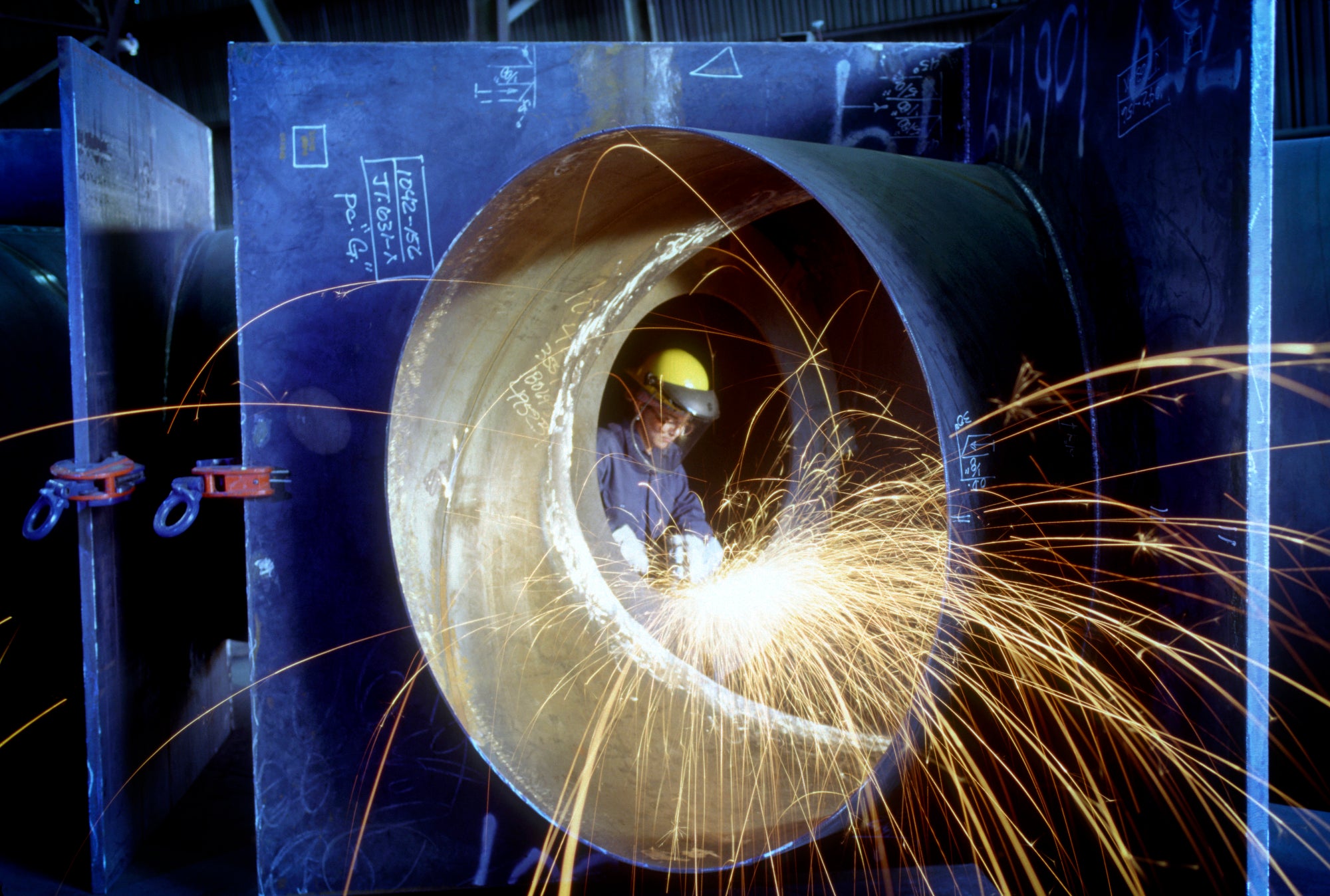California Rolls Up Its Sleeves on Industrial Pollution
How do we know if a sector is difficult to decarbonize if we haven’t tried?
When we talk about climate policy in California, what comes to mind? Everything that moves on wheels? Energy generation? There’s a glaring gap in the climate landscape few of us really dive into: the industrial sector. We rely on the industrial sector to make a wide variety of things from cheetos to cement. But heavy industry is a major polluter in California, responsible for 23% of our climate pollution. And yet, the sector is without a clear policy framework, a plan, or even a sense of possibility.

Workers use tools on an airplane wing in San Diego, California. (Frank Rogozienski / Getty Images)
If you’re reading this blog, you’ve probably heard the terms “hard to abate” or “hard to decarbonize” in reference to the industrial sector. We use this term to justify the lack of progress in the sector. It’s hard! We’ll get to it later?
We can no longer afford to wait. The cascading climate and air quality crises demand more urgent action. And we can’t call it hard until, well, we’ve actually tried. “Hard to” needlessly cedes power to the fossil fuel industry that they haven’t earned and don’t deserve, portraying the sector as too hard to touch. And, while there’s a lot to learn about the pathway forward to a zero-emission industrial sector, we know ceding a sector responsible for nearly 25% of our emissions to fossil fuel companies is a mistake.
The good news is that opportunity abounds in the industrial sector. Take the food and beverage industry, for example. California has more food manufacturing facilities than any other state. We’re world leaders in making not just food, but fun food: the tomato soup for lunch on a rainy day, the beer and wine with friends on a Friday night, the cheetos during a snack attack, the tortillas for our breakfast burritos, and on and on. We make it all here in California. And today, it’s dependent on methane gas. A lot of it. In Southern California, food manufacturing uses more methane gas than any industrial sector outside of the refineries.

Conveyor belt full of freshly baked breads in a factory. (gerenme / Getty Images)
It doesn’t have to be this way. Numerous studies from the likes of Lawrence Berkeley National Laboratory, the Renewable Thermal Collaborative, and Global Efficiency Intelligence have all pointed to the technical and economic potential of industrial heat pumps, ovens, and other zero-emission equipment to clean up food manufacturing. Regulators like the South Coast Air Quality Management District are even taking steps to transform the sector towards zero-emission equipment. The opportunities abound in other parts of industry (really, “the industrial sector” is a catch-all term for a dozen or more distinct industries), like paper and pulp, glass manufacturing, and apparel. California companies are even building zero-emission technology to clean up cement.
So where to start? With a plan. Earlier this year, Assemblymember Marc Berman introduced AB 841, which directs the state to develop an industrial electrification roadmap. As co-sponsors of the bill, we’re big fans. And the bill has garnered bipartisan support. Electrification through heat pumps, thermal energy storage, and more can take us a long way towards cleaning up the sector. How far? That’s what we need to figure out, along with the workforce needs, the emissions benefits, and the infrastructure planning on the grid side to facilitate broad electrification. The bill directs the California Energy Commission to work with other agencies to look at these issues and draft an electrification roadmap for the sector by mid-2025. It creates the space to get the best minds together to make this the sector formerly known as “hard to decarbonize.”
To be clear, AB 841 doesn’t preclude other technologies like hydrogen or Carbon Capture and Sequestration (CCS) from playing a role over time. Past legislation, like last year’s SB 905, has already launched efforts to take on CCS. And the fossil fuel industry has planted a seed that we can’t have specific venues and roadmaps for electrification. And, we get it — they’re scared. When folks realize that truly zero emission technologies, not overpriced unicorn climate strategies, can take us far, they will start to realize that kicking our industrial sector combustion habits may be easier than we thought. Overall, we need to end our approach of making the industrial sector a dumping ground for technologies like carbon capture or biogas, solutions we’ve fought so hard against in other areas like heavy-duty vehicles or power plants. Zero-emission strategies need their own focus and should sit at the center of any plan to clean up industry.
After all, as critical as addressing climate change is, California also has a long-standing air quality crisis that sickens breathers across the state on a daily basis. These emissions don’t harm Californians equally, either. An alarming 81% of NOx emissions from the food manufacturing industry are pumped out in overburdened communities already bearing the brunt of air pollution in the state. Likewise, 86% of NOx emissions from metals manufacturing are emitted in overburdened communities, and 93% of NOx emissions from chemicals manufacturing come from facilities situated in overburdened communities.

Brew kettles, right, and Lauter tons, left, at the the Anheuser-Busch brewery in Los Angeles. (Reed Saxon / AP)
California’s industrial sector is core to our state’s identity. These facilities provide good jobs and economic opportunities. Losing them would be tragic. The exciting opportunity AB 841 provides is not only to clean up emissions but a roadmap to drive innovation and investment that can strengthen and anchor California industry for decades to come. Whether it be the power, transportation, or buildings sectors, this approach has been tried and true for the Golden State.
Once again, California is on the cusp of something significant. AB 841 is the first bill of its kind anywhere in the country. An industrial electrification roadmap will serve not only Californians, but states across the country that can emulate and build on California’s leadership. Next up for the legislation is Senate Appropriations and then, hopefully, the floor. If you live in the Golden State, give your State Legislator a call and urge them to help pass AB 841.
The California Regional Office fights for the rights of all to a healthy environment regardless of where in the state they live; we fight to protect the magnificent natural spaces and wildlife found in California; and we fight to transition California to a zero-emissions future where cars, trucks, buildings, and power plants run on clean energy, not fossil fuels.
Zoe Woodcraft
Public Affairs and Communications Officer, Earthjustice
zwoodcraft@earthjustice.org
